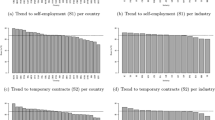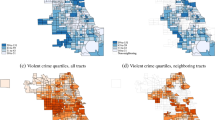Abstract
New models of employment show that there are some cases in which a minimum wage can have positive effects on employment and social welfare. The effects depend ultimately on the prevailing market wage and the frictions in the market. Card and Krueger (Am. Econ. Rev. 90(5), 1397–1420 2000) for example, argue that raising minimum wages sometimes increases employment. Based on this finding, we propose in this paper, a new approach to measure an employment via a fuzzy poverty measure and a relative minimum wage. An application using individual well-being data from Tunisia households in 2010 is presented.

Similar content being viewed by others
References
Abowd, J.M., Kramari, F., Lemieux, T., Mangolis, D.N.: Minimum Wages and Youth Employment in France and the United States. National Bureau of Economic Research, Working Paper. No 611 (1997)
Adams, S., Neumark, D.: The Effects of Living Wage Laws: Evidence from Failed and Derailed Living Wage Campaigns. NBER Working Paper No. 11342 (2005)
Belhadj, B.: A new fuzzy poverty index by distinguishing three levels of poverty. Res. Econ. 65(3), 221–231 (2011)
Belhadj, B., Limam, M.: Unidimensional and multidimensional fuzzy poverty measures: new approach. Econ. Model. 29(4), 995–1002 (2012)
Betti, G., Cheli, B., Lemmi, A., Verma, V.: Multidimensional and longitudinal poverty: an integrated fuzzy approach. In: Lemmi, A., Betti, G. (eds.) Fuzzy Set Approach to Multidimensional Poverty Measurement, pp. 111–137. Springer, New York (2006)
Betti, G., Gagliardi, F., Lemmi, A., Verma, V.: Sub-national indicators of poverty and deprivation in Europe: methodology and applications. Camb. J. Regions Econ. Soc. 5(1), 149–162 (2012)
Betti, G., Verma, V.: Fuzzy measures of the incidence of relative poverty and deprivation: a multi-dimensional perspective. JISS 17(2), 225–250 (2008)
Card, D., Krueger, A.B..: Myth and Measurement: The New Economics of the Minimum Wage. Princeton University Press, Princeton (1995)
Card, D., Krueger, A.B..: Minimum wages and employment: a case study of the fast-food industry in New Jersey and Pennsylvania: reply. Am. Econ. Rev. 90(5), 1397–1420 (2000)
Carter, T.J.: Minimum wage laws: what does an employment increase imply about output and welfare? J. Econ. Behav. Organ. 36, 473–485 (1998)
Cerioli, A., Zani, S.: A fuzzy approach to the measurement of poverty. In: Dagum, C., Zenga, M. (eds.) Income and Wealth Distribution, Inequality and Poverty, pp. 272–284. Springer Verlag, Berlin (1990)
Cheli, B., Lemmi, A.: A totally fuzzy and relative approach to the multidimensional analysis of poverty. Econ. Notes 24, 115–134 (1995)
Chiappero-Martinetti, E.: A multidimensional assessment of well-being based on Sen’s functioning approach. Riv. Int. Sci. Soc. 108, 207–239 (2000)
Ehrenberg, R.G., Smith, R.S.: Modern Labour Economics: Theory and Public Policy, Tenthth edn. Pearson Addison Wesley, Boston (2009)
Fields, G.S.: Wage floors and unemployment: a two-sector analysis. Labour Econ. 4(1), 85–91 (1997)
Flinn, C.: Minimum Wage Effects on Labor Market Outcomes Under Search with Bargaining. Working paper, New York University (2003)
Foster, J., Greer, J., Thorbecke, F.: A class of decomposable poverty measures. Econometrica 52, 761–765 (1984)
Freeman, R.: The minimum wage as a redistributive tool. Econ. J. 106(436), 639–649 (1996)
Goedhart, T., Hlberstadt, V., Kapteyn, A., van Praag, B.M.S.: The poverty line: concept and measurement. J. Hum. Resour. 12(4), 503–520 (1977)
Gramlich, E.M.: The impact of minimum wages on other wages, employment, and family incomes. Brook. Pap. Econ. Act. 2(76), 409–451 (1976)
Harris, J.R., Todaro, M.P.: Migration, unemployment, and development: a two sector analysis. Am. Econ. Rev. 60(1), 126–142 (1970)
Klasen, S., Woolard, I.: Surviving Unemployment Without State Support: Unemployment and Household Formation in South Africa. CEFifo Working Paper. No. 533 (2001)
Lemmi, A., Betti, G. (eds.): Fuzzy Set Approach to Multidimensional Poverty Measurement. Springer, New York (2006)
McLeod, D., Lustig, N.: Minimum Wages and Poverty in Developing Countries: Some Empirical Evidence. Brookings Discussion Papers in Economics, No. 125. The Brookings Institution, Washington (1996)
Mincer, J.: Unemployment effects of minimum wage. J. Polit. Econ. 84, 87–104 (1976)
Morley, S.: Structural adjustment and the determinants of poverty in Latin America. In: Lustig, N. (ed.) Coping with Austerity: Poverty and Inequality in Latin America. The Brookings Institution, Washington (1995)
Neumark, D., Wascher, W.: Minimum wages and employment: a case study of the fast-food industry in New Jersey and Pennsylvania: comment. Am. Econ. Rev. 90(5), 1362–1396 (2000)
Neumark, D., Wascher, W.: Do Minimum Wages Fight Poverty? NBER Working Paper No. 6127 (1997)
Neumark, D., Wascher, W.: Minimum Wages and Employment: A Review of Evidence from the New Minimum Wage Research, NBER Working Papers No 12663, National Bureau of Economic Research, Inc (2006)
Ravallion, M.: Poverty Comparisons. Fundamentals of Pure and Applied Economics Series. Harwood Academic Press, New York (1994)
Ravallion, M., Jalan, J.: Growth divergence due to spatial externalities. Econ. Lett. 53(2), 227–232 (1996)
Ravallion, M., Wodon, Q.: Poor areas, or only poor people? J. Reg. Sci. 39(4), 689–711 (1991)
Rebitzer, J.B., Taylor, L.J.: The consequences of minimum wage laws: some new theoretical ideas. J. Public Econ. 56, 245–255 (1995)
Sen, A.K.: Poverty: an ordinal approach to measurement. Econometrica 44, 219–231 (1976)
Tunisian National Institute of Statistics: Enquête Sur le Budget et la Consommation des Ménages en Tunisie. Ministère du plan, Tunis (2010)
Wessels, W.: The effects of minimum wages in the presence of fringe benefits: an expanded model. Econ. Inq. 18, 293–313 (1980)
Wessels, W.: Minimum Wages, Fringe Benefits, and Working Conditions. American Enterprise Institute for Public Policy Research, Washington (1980)
Zadeh, L.: Probability theory and fuzzy logic are complementary rather than competitive. Technometrics 37, 271–276 (1965)
Author information
Authors and Affiliations
Corresponding author
Rights and permissions
About this article
Cite this article
Besma, B. Employment measure in developing countries via minimum wage and poverty new fuzzy approach. OPSEARCH 52, 329–339 (2015). https://doi.org/10.1007/s12597-014-0176-3
Accepted:
Published:
Issue Date:
DOI: https://doi.org/10.1007/s12597-014-0176-3
Keywords
- Poverty line
- Poverty membership function
- Employment membership function
- Fuzzy poverty measures
- Fuzzy employment measures




